- Home
- Medical news & Guidelines
- Anesthesiology
- Cardiology and CTVS
- Critical Care
- Dentistry
- Dermatology
- Diabetes and Endocrinology
- ENT
- Gastroenterology
- Medicine
- Nephrology
- Neurology
- Obstretics-Gynaecology
- Oncology
- Ophthalmology
- Orthopaedics
- Pediatrics-Neonatology
- Psychiatry
- Pulmonology
- Radiology
- Surgery
- Urology
- Laboratory Medicine
- Diet
- Nursing
- Paramedical
- Physiotherapy
- Health news
- Fact Check
- Bone Health Fact Check
- Brain Health Fact Check
- Cancer Related Fact Check
- Child Care Fact Check
- Dental and oral health fact check
- Diabetes and metabolic health fact check
- Diet and Nutrition Fact Check
- Eye and ENT Care Fact Check
- Fitness fact check
- Gut health fact check
- Heart health fact check
- Kidney health fact check
- Medical education fact check
- Men's health fact check
- Respiratory fact check
- Skin and hair care fact check
- Vaccine and Immunization fact check
- Women's health fact check
- AYUSH
- State News
- Andaman and Nicobar Islands
- Andhra Pradesh
- Arunachal Pradesh
- Assam
- Bihar
- Chandigarh
- Chattisgarh
- Dadra and Nagar Haveli
- Daman and Diu
- Delhi
- Goa
- Gujarat
- Haryana
- Himachal Pradesh
- Jammu & Kashmir
- Jharkhand
- Karnataka
- Kerala
- Ladakh
- Lakshadweep
- Madhya Pradesh
- Maharashtra
- Manipur
- Meghalaya
- Mizoram
- Nagaland
- Odisha
- Puducherry
- Punjab
- Rajasthan
- Sikkim
- Tamil Nadu
- Telangana
- Tripura
- Uttar Pradesh
- Uttrakhand
- West Bengal
- Medical Education
- Industry
Serum melatonin levels may predict mortality in patients with traumatic brain injury

Spain: A new study conducted by Leonardo Lorente and the team showed the existence of greater blood melatonin levels in non-survivors than in survivors on days 1, 4, and 8 following traumatic brain injury (TBI), as well as the capability to predict 30-day mortality for serum melatonin levels evaluated at these time points. The findings of this study were published in the journal Anaesthesia Critical Care & Pain Medicine.
Secondary brain damage may occur following TBI as a result of neuroinflammation, oxidation, and apoptosis. On admission for TBI, non-surviving patients had higher levels of serum melatonin than surviving patients. Thus, the goal of this study was to determine serum melatonin levels in the 1st week of TBI in surviving and non-surviving patients, as well as to determine if serum melatonin levels during the first week of TBI may be used to predict mortality.
For this study, patients with an isolated and severe TBI were included if they received 10 points on the non-cranial elements of the Injury Severity Score and 9 points on the Glasgow Coma Scale. Serum melatonin levels were assessed on days 1, 4, and 8 after TBI. The study's endpoint was 30-day mortality.
The results of this study stated as follow:
1. On days 1, 4, and 8 following TBI, surviving patients (n = 90) had lower blood melatonin levels than non-survivors (n = 34).
2. The area under the curve for the prediction of 30-day mortality on days 1, 4, and 8 after TBI was 0.85, 0.82, and 0.71 respectively.
In conclusion, the existence of greater levels of serum melatonin on days 1, 4, and 8 following TBI in non-survivors than in survivors, as well as the ability to predict 30-day mortality for serum melatonin levels tested at these time points, were the study's novel results. More study, however, is required to corroborate our findings.
Reference:
Lorente L, Martín MM, Ruiz C, Abreu-González P, Ramos-Gómez L, Argueso M, Sole-Violan J, Cáceres JJ, Jiménez A. Serum melatonin levels in predicting mortality in patients with severe traumatic brain injury. Anaesth Crit Care Pain Med. 2021 Dec;40(6):100966. doi:10.1016/j.accpm.2021.100966. Epub 2021 Oct 27. PMID: 34718184.
Medical Dialogues consists of a team of passionate medical/scientific writers, led by doctors and healthcare researchers. Our team efforts to bring you updated and timely news about the important happenings of the medical and healthcare sector. Our editorial team can be reached at editorial@medicaldialogues.in.
Dr Kamal Kant Kohli-MBBS, DTCD- a chest specialist with more than 30 years of practice and a flair for writing clinical articles, Dr Kamal Kant Kohli joined Medical Dialogues as a Chief Editor of Medical News. Besides writing articles, as an editor, he proofreads and verifies all the medical content published on Medical Dialogues including those coming from journals, studies,medical conferences,guidelines etc. Email: drkohli@medicaldialogues.in. Contact no. 011-43720751


